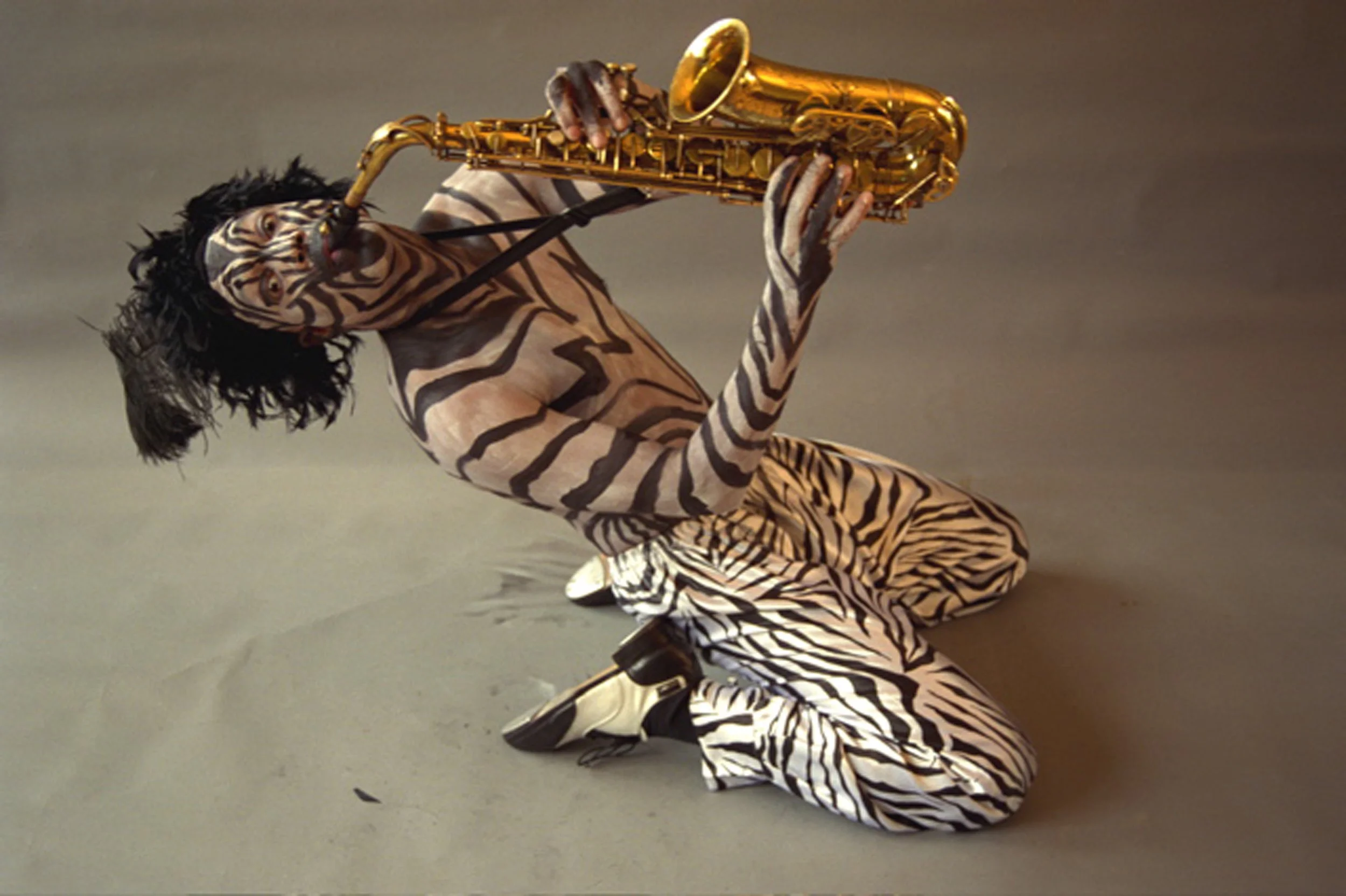Idris Ackamoor: Building a Future You Can Dance To
Idris Ackamoor. Photo: Pat Mazzera
The plan isn't just a performance. It’s an experience—half theater, half ritual, and part dance floor communion—led by a saxophonist who’s spent fifty years creating music that refuses to stay still.
“I call myself an artistic being,” Idris Ackamoor says, explaining how his days flow in a single arc of composition and rehearsal from a home turned studio. “My apartment has become my home studio. I use the piano, my saxophone, and voice as instruments to create music… Sometimes I might be just improvising on the piano, and in that process, I come up with a melody or a rhythm that then gets transferred onto paper… like a child that begins to walk and matures through the process.”
His newest live release, Artistic Being, was recorded in San Francisco with the Ankhestra and two longtime co‑conspirators, actor Danny Glover and theater artist Rhodessa Jones. The project uses spoken‑word tone poems with wide-screen ensemble writing, extending the theatrical jazz language he has cultivated since the 1970s. “Rhodessa goes way back,” he says. “She’s been part of my nonprofit performing arts company, Cultural Odyssey, which I founded in 1979… Danny would always come around… he really enjoyed what we were doing. When this opportunity arose through a grant supporting change makers in the arts community, the first two people that came to my mind were Danny Glover and Rhodessa Jones.”
Those voices didn’t just ornament the music; they transformed it. “I’ve always said that both Danny and Rhodessa have two of the most unique voices in theater… When you hear Danny Glover’s voice, you can tell that’s him… And then Rhodessa also has this amazing spoken‑word voice that, when you hear Rhodessa speak, you know that’s Rhodessa,” he says. That clarity of identity is his aim on horn, too: “When someone hears me playing tenor or alto saxophone, I want it to stand out… so when you hear me play it, that’s me and no one else.”
Photo: Pat Mazzera
One of the record’s most searing passages, “The Grandma Cole Story,” channels a family history handed down by an elder and shaped by Jones’s text. Ackamoor recounts the image of a child—his ancestor—briefly let out of a slave ship’s hold, freeing caged birds before suffering brutal punishment. “The image symbolizes resilience in the face of adversity,” he says. “She embraced the mixture that’s going on… the very multiculturalism of the African American experience and our experience as Americans.”
Afrofuturism, in Ackamoor’s hands, isn’t a costume—it’s a compass. He traces his path back to Antioch College in the early 1970s, where a self-designed study-abroad program sent him through Paris and Amsterdam to Morocco and Ghana, the crucible where the Pyramids were forged. “Afrofuturism draws much of its inspiration from Africa and Egypt,” he says, noting Sun Ra’s visibility and writers like Octavia Butler, but grounding his own approach in nine formative months on the continent. “I believed I was simply making music from my heart and soul. However, my nine months in Africa had a profound influence and inspiration on me… This rhythm foundation… mixed with jazz, combined with avant‑garde elements.” That blend, he argues, is how you reach “the people in their twenties and thirties,” and keep a tradition evolving.
If that sounds theoretical, the stage plan makes it practical. “We just did a show on the French Riviera, in Nice, at Foundation Maeght… We performed from nine‑thirty to eleven, and then [DJ] Gilles Peterson came on… After that, everyone was dancing and moving,” he says, describing a multigenerational crowd and the continuity between live band energy and DJ flow. “I think that is the future in many ways.”
That future animates his upcoming “Night of the Exotictress,” a Pyramid’s event designed as a pre‑Halloween costume invitation and an immersive theater piece. “It’s a very exotic kind of melody… I’m calling it Night of the Exotictress,” he says with a poet’s grin. “We’re encouraging people to dress up in their most exotic costumes… This is about involvement and participation—breaking down the wall, in theater terms—to make the audience part of the experience. You can dance, engage, and sometimes we’ll bring the music to the crowd… It’s going to be a happening with projections, using the amazing projection system at the Miner Auditorium.”
Ackamoor’s catalogue and presence stretch well beyond a single night. The Chicago-born bandleader and composer co-founded Cultural Odyssey, which has led The Pyramids across primary European and U.S. stages, and has released a string of acclaimed recordings on Strut Records—Shaman! among them, drawing praise for their Afrofuturist vision and elastic groove language. Critics have heard echoes of Sun Ra, Fela, and Ben Webster in his work; the through-line is his own.
His protest piece “Police Dem” emphasizes that theme clearly. “Without a doubt, Fela has been an inspiration to me,” Ackamoor says, pointing to the directness of “Zombie” and to the American realities that shaped his lyric: “Police dem, the knee on your neck… Police dem shoot you so young.” The song, he stresses, reaches beyond indictment toward humanity: “Police dem some good, most bad… we all the same… I really get to the meat of it all through the human perspective.”
Legacy, for him, is both an archive and a lifeline. Years of work with Strut have ensured that his master recordings are preserved and released over time, while he maintains his songwriting and publishing—an intentional and rare arrangement that preserves his creative control. “My legacy now resides with Strut Records, stored in their vaults,” he says. “They’ll be releasing my music for the next 20 years.”
Even so, the day‑to‑day remains tactile: reeds, keys, voice; rehearsal rooms and projection cues; building sets that move like a film. “We don’t just sit and play with head melodies or do standard jazz improvisation,” he says of the show’s flow. “The compositions flow smoothly from one to the next, creating a seamless transition… It’s not about just sitting quietly… this isn’t it.”
For new fans, Ackamoor’s message is simple: come prepared to participate. The dance floor is ready, the projections are set, and the band’s spirit is driven by rhythm, improvisation, and storytelling—Africa and America exchanging in real time. And if he could send a message back to the young saxophonist leaving Antioch? The answer also serves as a call to anyone entering the room now: “Keep pushing forward! You’re on the right path!”
Ticket Info
Event: Idris Ackamoor & The Pyramids — Night Of The Exotictress.
Where: Miner Auditorium (SFJAZZ Center), San Francisco
When: Thursday, October 2
Showtime: 7:30 pm • Dance floor show
Tickets and info at SFJAZZ.org.



